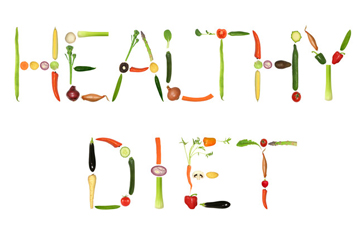
Here are some valuable tips that can help you maintain a healthy diet:
- Watch your portion sizes: Portion control is a key factor in healthy eating. Try to eat a lot of variety foods such as fruits and vegetables, whole grains, legumes, lean meats, fish, eggs, nuts, and seeds in moderate portions. By doing so, your meals would be enjoyable, interesting and nutritious. A balanced meal would have a protein source, a grain or starchy vegetable, fresh vegetables, and healthy fat.
- Consume a Variety of Foods: To full your nutrient requirement, eating the same food continually is not a good idea. Instead, eat a wide assortment of foods that could help you to ensure that you will get all the necessary nutrients. In addition, this will also limit your exposure to any pesticides or toxic substances that may be present in one particular food.
- Eat Plenty of Food from Plants: Eat more foods from plants such as vegetables, fruits, whole grains, legumes (that is, beans and lentils). Such food is loaded with proteins, carbohydrates, fiber and many. The nutrients, fiber and other compounds in these foods may help protect against certain types of cancer and other diseases. If you are diabetic or prone to diabetic then include non-starchy veggies like broccoli, asparagus, bok choy and other types of cabbage, artichokes, onions, garlic, cauliflower, celery, zucchini, turnips, carrots, squash, and all leafy greens. Choose whole fruits over juice for more fiber.
- Limit Refined Grains, Added Sugar: Refined carbohydrates in white bread, pasta and other snacks foods have little to no dietary fiber and nutrients. Also, sugary foods are high in fat and calorie dense. So limit your intake of these items.
- Consume More Fish and Nuts: Fat is an important part of healthy diet as it’s a major source of energy that helps your body to absorb some vitamins and minerals. Choose foods that are rich in healthy fats such as nuts, fish high in Omega-3, and avocados.
- Cut Down on Animal Fat and avoid Trans Fats: Avoid or limit saturated and trans fat as it unhealthy and has no nutritional value. To cut down animal fat choose, lean meat skinless poultry and nonfat or low-fat dairy products and replace saturated fats, with “good” fats, found in nuts, fish and vegetable oils. Fats that are found in processed foods or trans fats can potentially increase the risk of heart disease, so try to avoid or minimize the use of such food products.
- Choose Food Over Supplements: Always try to get your vitamins and minerals from natural foods, not from supplements (except if your doctor recommended). Food supplements cannot replace a healthy diet.
- Limit Alcohol: Drink in moderation is a key point to alcohol users, that is, no more than one drink a day for women, two a day for men. Too much alcohol may increase your risk of health problems and damage your heart.
- Listen to your body’s signals: It’s important you to distinguish between emotional hunger and physical hunger. The main reasons for weight gain are overeating at meals, emotional eating, or excessive snacking when you’re really not feeling hungry. The Hunger Scale can help you figure out when to eat and when not to eat. If you are having a hard time getting rid of those extra pounds, it’s important to check what you eat as well as how you eat.
- Balance the food you eat with physical activity: Physical activity alongside healthy diet is an important consideration.
Last but not least, enjoy your food and mealtimes in the company of your loved ones. According to research, shared mealtimes, especially during childhood, may act as a “protective factor” for many nutrition health-related problems as well as increase prosocial behavior in adulthood.